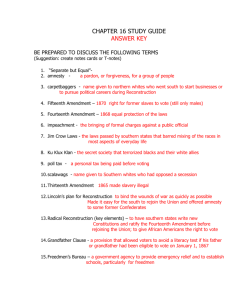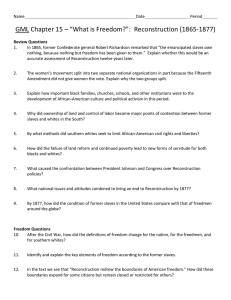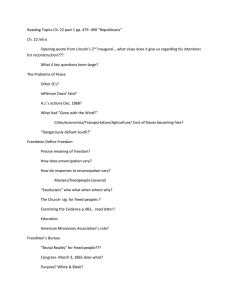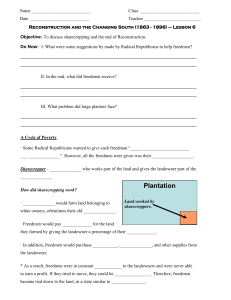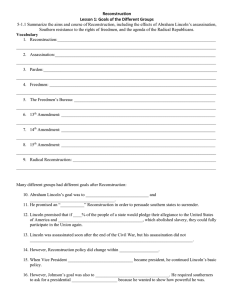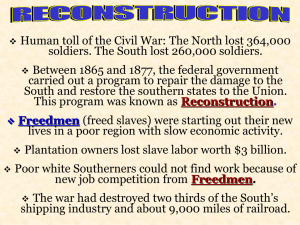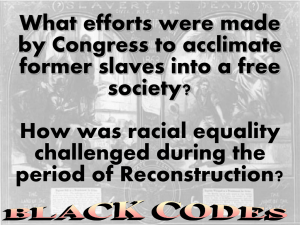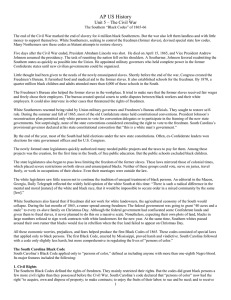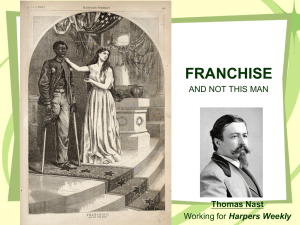Reconstruction Era-1865-1877
advertisement
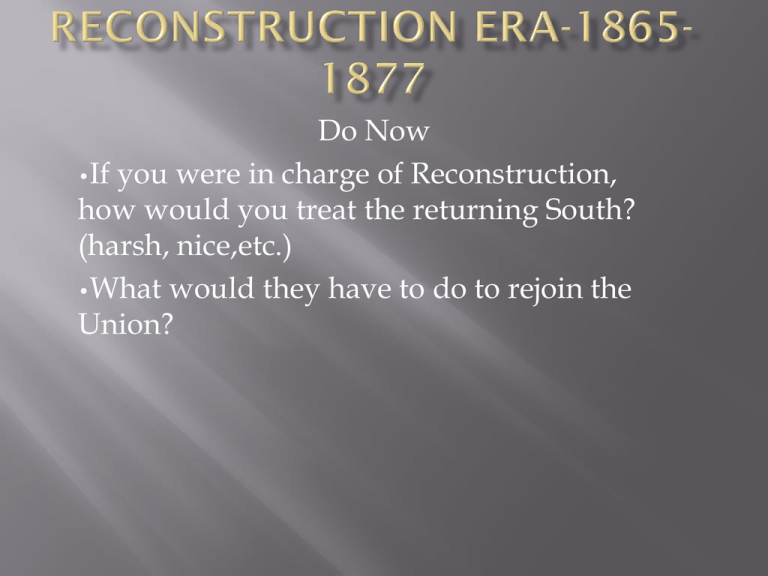
Do Now •If you were in charge of Reconstruction, how would you treat the returning South? (harsh, nice,etc.) •What would they have to do to rejoin the Union? “War is cruelty, and you cannot refine it. We are not only fighting hostile armies, but a hostile people, and must make young and old, rich and poor, feel the hard hand of war!” Rebuild infrastructure Towns/railroads/farms/factories etc. Re-organize political system What to do with the 4 million former slaves? What to do with the Confederate leadership? (Soldiers, generals, government?) Who should be in charge of the Reconstruction? (South, President, Congress?) How to rebuild the economy of the South? Lincoln’s Plan 10% plan- oath! VERY EASY Andrew Johnson’s Plan 13TH AMENDMENT/ TOUGHER THAN LINCOLN Radical Republican Congress Plan CONGRESS RUNS SHOW HARDEST BY FAR/ THE ONE USED 9 YR MILITARY OCCUPATION Food/clothing/shelter $$ for transportation to move or to help find family members that were shipped away Education/jobs Lawyers to legalize slave marriages Problems faced by Freedmen’s Bureau Lack of $$$ Few volunteers/ low paying Resistance by southern whites 80% eligible freedmen joined Republican party Carpetbaggers 7 blacks in 1870 Congress (Hiram Revels- 1st black Senator, took Jefferson Davis old seat in Senate 90% eligible freedmen voted (at first) Northerners who moved to the South to “help” in Reconstruction Scalawags Ancient Irish term for a runty, worthless animal Southerners who joined Republican Party/aided Reconstruction General Longstreet If you were now a former freed slave, would you a) try to go back to Africa b) move to the North c) stay in the South Why?????? 97% stayed in the South (500 freedmen from Virginia moved North) Why so few?? No $$ to move North Low paying jobs in the North The only skill they had was farming, factory work foreign to them Almost all were born in the US by now, so Africa was not their home Families in the South By 1910, only 10% of blacks lived in the North or West of the US WWI- “Great Migration” to the North Most former slaves took part in the labor system of sharecropping Freedmen rented land from former slave owner Gave ½ to 2/3 of their crop yield to the landowner Fair System? Positives Kind of their own land Personal stake in the outcome Not wage labor/share with landowner risk/reward system Negatives Borrowing $ until crop yields for basic necessities/permanent debt Never owning their own land/similar to serf system in Middle Ages Lasted for almost 100 years Washington Du Bois “Up From Slavery” Basically self-educated, born into slavery Tuskegee Institute (Alabama) Gradual equality- accept discrimination now….get education, skills, earn good living, then equal rights will come Founded NAACP Wanted equal rights immediately Whites will never treat us equal, so we must fight thru courts to get it or return to Africa 1st to graduate from Harvard “Talented Tenth” Which guy do you agree with more and why? •How could Southern state governments deny African-Americans their rights of voting and equality? Literacy Tests Poll Taxes You had to know how to read in order to vote Is this a good idea? Overturned by Voting Rights Act 1965 You had to pay to vote Is this fair? Overturned 24th amendment 1964 Grandfather Clauses Various ways to exclude poor whites from literacy test/poll taxes, etc. If your grandfather was eligible to vote Jim Crow Laws Segregation of the races in public places How was this allowed to exist as laws? Upheld by Plessy vs. Ferguson Overturned by lots of cases, laws during Civil Rights movement, Brown vs. Board of Ed was main thrust
